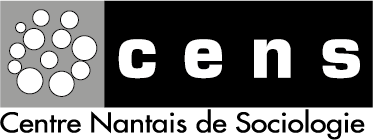Research themes
General theme of CENS :
Analysis of the reshaping of contemporary societies
Line of inquiry 1 : Popular groups and social dynamics
Persons in charge : Thibaut Menoux, Séverine Misset, Sophie Orange
- Sub-line 1.1 : Employment, work and the reshaping of the operational workforce
- Sub-line 1.2 : Solidarities, conflicts and political mobilisations
- Sub-line 1.3 : 'Ordinary' relationships to moral standards and educational institutions
Line of inquiry 2 : Beliefs, occupations and economic behaviours
Taking seriously the importance of economics in contemporary social hierarchies as well as the transformations of capitalism, the ' Occupations, behaviours and economic beliefs' line of inquiry is nonetheless characterised by an ambition not to confine analyses to a specialised sociology, but rather to look at economic issues - and the realities of work in which they are often caught up - in the light of a general sociology that makes it possible to mobilise authors, theories and investigations that are potentially far removed from the economic field. Economic behaviours are considered here as a particularly relevant angle from which to gain an understanding of the processes of rationalisation of activities and the transformation of social and professional groups. The issues involved in economic classifications contribute to the objective and subjective delimitation of these groups, which implies connecting the practices and beliefs of economic players (whether or not they see themselves as such) with their socio-professional profiles. This stance has made it possible to foster a stimulating dialogue with economists, who do not all consider that they have resolved the issue of measuring social utility by identifying it with the merchant price. It also has the advantage of revitalising the sociological approach to occupations. The question of borders and their porosity, between the economic and the social, is thus revisited: borders between a so-called merchant economy and a so-called social and inclusive economy, the employer and the management, work and commitment, the political and the religious. In five years, this emerging line of inquiry has lived up to its promise: four theses and two "habilitation à diriger des recherches" have been defended in relation to these issues, new researches are going more deeply into existing reflections, and others are innovating by engaging in the field of small economic elites and their mobilisation; it has also made it possible to broaden the perimeter of the laboratory's scientific relations without neglecting the concerns of a certain social demand. Scientific production has developed in three directions:
- Sub-line 2.1 : The frontiers of the economy
- Sub-line 2.2 : Companies and Entrepreneurship(s)
- Sub-line 2.3 : Professionals' groups dynamics
Line of inquiry 3 : Categories and institutions of public action
The aim of the research programme (2010-2015) initiated by the line is to shift the focus away from the institutionalist and relatively disconnected approaches that prevail in the field of research into local public action. In line with the sociological realism developed at CENS, the aim is to study working practices in the implementation of local public policies. The research aims to provide a better understanding of local modes of action and their impact on the social order. More precisely, line 3 is part of a reflection widely shared by the social sciences on the transformations in the ways in which contemporary societies are governed, but by focusing primarily on the processes involved in the production of political-administrative categories and on their local applications. The 'categories', 'tools', ' mechanisms' and 'measures' adopted to deal with local problems are therefore always understood as objectified representations and the institutionalised result of the competitive mobilisation of multiple actors, whose configuration of relationships, trajectories and modes of thought and action are brought to light. The research in Axis 3 looks at public action from the angle of a localised approach to political and administrative work. While it confirms that, depending on the local configurations, the players have a relative autonomy of action, which tends to produce contrasting situations in the application of measures, it is above all the knowledge mobilised for and by 'local governments' that has gradually become the focus of research concerns. Less than a sociology of territorialised public policy, line 3 seeks above all to develop a sociology of the mobilisation of knowledge and techniques likely to guide the representations and behaviours of 'local governments'. This ambition requires the analysis of the tools of public action to be combined with that of the production of categories of thinking and action. In 2014, the members of line 3 decided to change the title of the line from 'Public action and territories' to 'Sciences of government and categories of action' in order to better reflect this orientation. The research is organised into three sub-lines:
- Sub-line 3.1 : Genesis and institutionalisation of political problems and public mechanisms
- Sub-line 3.2 : Agents and territories of public action
- Sub-line 3.3 : Effects and ownership of public action
Health, Body and Sports
Formed in 2010, the 'Health, body and sport' line of inquiry was intended to highlight CENS's contribution to the production of knowledge on a range of topics: the construction of health problems, the links between health and work, the conditions of access to care, the use of medicines, the ethical deliberations of health professionals faced with uncertain situations, or else the role of the State and public policies (European, national and local) in the management and discipline of corpses, in the '(in)visibility' of certain knowledge that is nonetheless medically established, or in the contradictory injunctions to which professionals involved in the management of corpses, sports and care are subject. The work carried out has benefited from Nantes' long tradition of investigating sports practices on the one hand, and health on the other. The scientific challenge was to combine research about these two empirical fields with a focus on the 'cultures of the body'. This was reinforced in October 2013 by obtaining a regional grant for a thesis on wear and tear on the bodies of professionals involved in supervising water sports activities for tourism purposes, and in October 2014 by obtaining a doctoral contract regarding the patients - some of whom are sports enthusiasts - of etiopaths.
The work in line 4 thus aims to analyse what the social system does to bodies, based on a sociology of the 'somatic cultures of classes', inseparably linked to a sociology of the agents and institutions involved in an activity of 'governing corpses' (doctors and other 'carers', criminal judges, referees, sports coaches and other supervisors, PE teachers). The common intention here is to place research on health, bodies and sports within the perspective of a sociology of social and political morals, attentive to the study of public mechanisms specific to sport and health. It thus examines the reshaping of justifications for legitimacy in terms of bodily ways of being and the uses to which the body is put, as well as the 'treatments' (social, medical, penal, educational, etc.) to which the body can or must be subjected. Marked by a desire for dialogue with the scientific specialisms that currently dominate the field of the body and health (biology, experimental medicine, neurosciences, epidemiology, etc.), the research carried out or in progress focuses on a sociology of the invisibility of the social determinations that affect biological bodies and relationships to the body and health. Without neglecting the contribution of history to the subject, this research is systematically based on contextualised surveys, analysis of archives and quantitative data. It forms part of the many scientific partnerships involved in funded research programmes currently underway (MIGSAN, LMA, AUTOMED, etc.) or recently launched (ANR 'Réprimer et soigner'). The promotion of the results obtained is favoured by the relations maintained at regional, national and international level with various non-academic institutions (Cancéropôle, Gérontopole, Permanence d'accès au soins de santé, University Hospital, " Recherche et sport en Pays de la Loire " network, Comité régional de prévention des risques professionnels, French Ministry of Culture, UNESCO, French Health Agency...).
In order to respect the contours of the research groups and networks in which the contributors to line 4 are involved, three mutually permeable thematic sub-lines have been identified:
- Sub-line 4.1 : Physical commitments and sports coaching
- Sub-line 4.2 : Health and occupational risks
- Sub-line 4.3 : Healthcare policies and access to care



